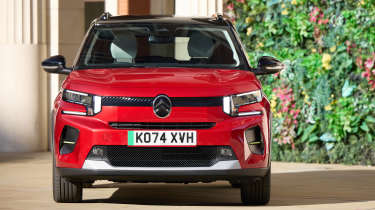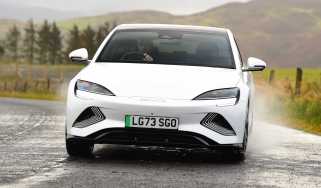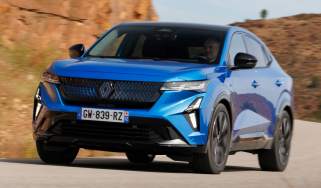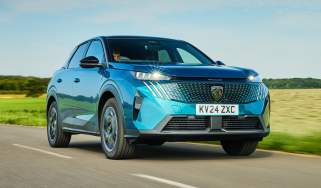Citroen e-C3 review
This cheap French supermini is exactly the sort of small electric car we’ve been waiting for ever since battery tech hit the big time

Our opinion on the Citroen e-C3
When the era of electric cars really took off, we always felt that the technology would make the most sense powering small, affordable and clean transport. Following an initial diversion via some large, very expensive SUVs, it feels like the industry - and particularly Citroen - has finally landed on the ideal formula. It’s not only the price point of the e-C3 that appeals, however; Citroen has produced a supermini with class-leading comfort and plenty of space, all while creating a car that doesn’t feel like it’s unduly compromised by its low price point. The e-C3 really is a benchmark for the rest to aim for.
| Key specs | |
| Fuel type | Electric |
| Body style | Five-door hatchback |
| Powertrain | 1x e-motor; 111bhp/120Nm |
| Safety | TBC |
| Warranty | 3-8 years |
About the Citroen e-C3
It’s easy to make a big car profitable. When you’re asking six figures for a car, prospective buyers aren’t going to bat an eyelid at the prospect of the extra few grand needed to clear a manufacturer's margins. It’s much tougher when it comes to small cars, though - just ask Ford and all of the other brands that have gradually backed away from making superminis in recent years. That squeeze becomes even tougher when shoehorning electric powertrains into a small car, because they (in particular, the battery packs) are still more expensive than petrol or diesel engines. However, price parity grows ever nearer, and the Citroen e-C3 is one car that capitalises on this in spectacular style.
Used - available now
While base petrol versions of the fourth-generation C3 are cheaper still, the e-C3 is still so competitively priced that it costs much the same as many petrol-powered superminis. Starting at a shade under £22,000, it costs a few hundred pounds less than the cheapest Skoda Fabia that's available with an automatic gearbox.
So in addition to electric rivals like the brilliant Renault 5 and the Fiat Grande Panda, with which the e-C3 shares its platform and running gear, the e-C3 can legitimately claim to take on the best internal combustion-engined superminis; in addition to the previously mentioned Skoda Fabia and the excellent Renault Clio, other alternatives include the Volkswagen Polo, Toyota Yaris and Vauxhall Corsa.
Citroen has kept the line-up very simple, with just two trim levels - Plus and Max - and the bare minimum of options. From launch, there is just one powertrain, too - a 111bhp motor is paired with a 44kWh battery. Typically fast EV acceleration isn’t the aim here; instead, the e-C3 gives performance on a par with a similarly priced petrol small car. And while £22,000 is a competitive price point already, Citroen will release an even cheaper model in the future. An entry-level e-C3 with a smaller battery pack - reducing range from 199 miles (WLTP) of the current car down to 124 miles - will likely start from below £20,000 when it’s launched.
Performance & driving experience
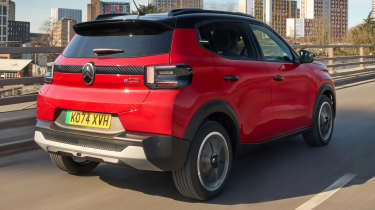
| Pros | Cons |
|
|
Citroen has done an amazing job in keeping the e-C3’s price down to the level of many petrol-powered superminis, and the powertrain plays a big part in this. While loads of other EV makers go for power outputs that often seem a bit much for a sensible everyday vehicle, Citroen has instead made sure that its C3 matches the figures you’d get from any other internal combustion-powered small car. As a result, there’s a single motor up front, and it makes 111bhp and 120Nm of torque.
Performance, 0-60mph acceleration and top speed
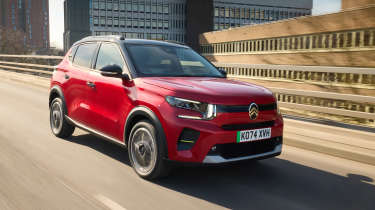
Those stats are enough to get the e-C3 from 0-62mph in an unremarkable, but perfectly acceptable, 11 seconds flat. Top speed is 84mph.
In reality, the e-C3 feels a bit more lively than an equivalent petrol or diesel car that’s capable of those numbers. That’s because although its electric motor doesn’t deliver anything like the sort of punch we’ve grown used to with many EVs, it still responds more keenly than a traditional engine. That’s even more so because the maximum output of that motor is available at any road speed - there are no gears to worry about here. The motor emits a little whine under hard acceleration, but it’s not too intrusive or unpleasant.
Regenerative braking helps to add some charge back into the battery when slowing down, and the first portion of the brake pedal’s travel decelerates the car using the electric motor rather than the mechanical brakes. Lifting off gives only a slight level of regen, while pressing the ‘C’ button beside the gear selector increases the level of deceleration, but not by very much.
Town driving, visibility and parking
One of the first things that springs to mind when we think of Citroens is pillowy soft ride comfort, and that’s certainly the case with the e-C3. The brand’s Advanced Comfort tech makes use of the hydraulic bump stops already fitted to many Citroens; these help to reduce the shock at the top of the car’s suspension travel, enabling the primary springs and dampers to be tuned for a softer response without unduly compromising body control. Around town, this means that the C3’s ride is very forgiving, soaking up imperfections that would jostle and rattle many of its competitors.
The high driving position makes it easy to see out - especially from the front seats - and light steering makes it easy to twirl the wheel as you move in and out of tight spots. Both trim levels get rear parking sensors as standard, while the top-spec Max trim gets a reversing camera, too.
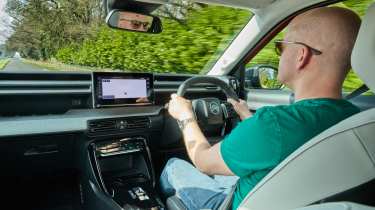
B-road driving and handling
With that soft ride, however, it’s fair to say that keen handling isn’t high up the C3’s list of priorities - a Renault 5 is a more enjoyable small EV to drive - but given the Citroen’s relative low weight by EV standards, plus body roll that is kept fairly well in check, it’s more competent around the corners than the pillowy suspension would have you believe at first. If anything, it’s the steering that lets the side down the most. With so little feedback, it’s a car that you tend to relax into pur;ly because it’s hard to know what the front tyres are up to. It may seem a little fussy to make such a complaint in a car like this, but other small EVs, particularly the Mazda MX-30, prove that decent ride comfort and an enjoyable drive don’t have to be mutually exclusive.
Motorway driving and long-distance comfort
That fairly bluff front end tends to generate quite a bit of wind noise once you reach motorway speeds. The ride comfort remains fairly soothing at higher speeds, though, but the light steering means that the e-C3 doesn’t feel as settled or as planted as a Renault 5 when cruising.
| Model | Power | 0-62mph | Top speed |
| Citroen e-C3 Plus | 111bhp | 11.0 secs | 84mph |
| Citroen e-C3 Max | 111bhp | 11.0 secs | 84mph |
Expert view, on driving experience
“It’s really refreshing to drive a modern car that doesn’t pretend to be sporty. The e-C3 is unashamedly about delivering comfort, and nails it. I hope that more everyday cars will follow its lead.” - Alex Ingram, chief reviewer. Attended the UK launch of the e-C3.
Range, charging & running costs
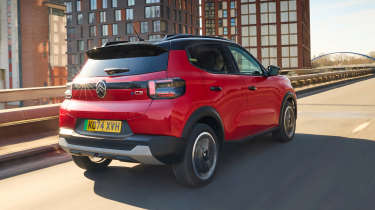
| Pros | Cons |
|
|
Electric range, battery life and charge time
Small electric vehicles promise to be some of the very cheapest cars to run, and with the Citroen e-C3 priced as cheaply as some petrol-powered superminis, it’s certainly going to be a bit of a bargain - especially if you can make the most of low electricity costs by charging at home.
The e-C3 is best suited to urban driving, although there’s enough range for occasional motorway trips, too. The 44kWh battery is modestly sized compared with many electric cars, yet the 199-mile WLTP range looks to be enough for the overwhelming majority of users. The way that you drive the car will have a large influence over the overall range and efficiency; on a 90-minute drive, a large proportion of which was on 70mph roads, we achieved 3.5 miles/kWh, which works out at a 153-mile range.
However, keep off the motorways, and on a route with speeds mostly below 50mph, that figure climbs up to roughly 5.0mi/kWh – boosting the range to 220 miles. Those numbers were achieved at temperatures of 13 degrees Celsius; closer to freezing, those numbers will drop, but on a hot summer’s day, they will improve further. It means that the e-C3’s range comes close to matching what we achieved in the Renault 5 - although that car uses a slightly larger battery pack to achieve its numbers.
At up to 100kW, the charging speeds are decent for a car in this class, and a 20-80 per cent top-up takes 26 minutes.
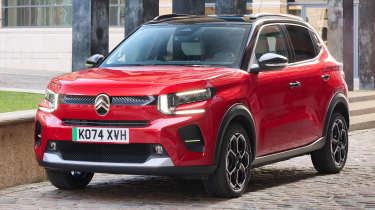
| Model | Battery size | Range | Insurance group |
| Citroen e-C3 Plus | 44kWh | 199 miles | 24 |
| Citroen e-C3 Max | 44kWh | 199 miles | 24 |
Insurance groups
As it stands, both the Plus and Max versions of the e-C3 sit in group 24. That’s a little higher than the Renault 5, which ranges from 20 to 22.
Tax
Thanks to a Benefit-in-Kind banding of just 3 per cent (from April 2025 onwards) and a low purchase price, very few cars on sale today are as cheap to run for company car users. Private buyers will benefit from a first-year VED rate of just £10. This will then increase to the standard rate of £195 from the second year onwards.
Depreciation
Initial estimates suggest that the e-C3 is set to depreciate a little more than some rivals. After three years or 36,000 miles, it’s expected to hold onto roughly 44 per cent of its original value; that’s about the same as a similarly priced petrol Skoda Fabia, but the all-electric Renault 5 is predicted to hold onto roughly half of its value over the same period.
Interior, design & technology
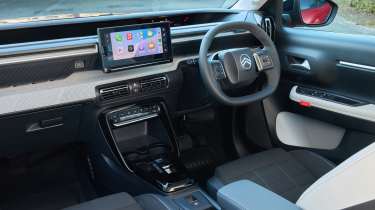
| Pros | Cons |
|
|
The e-C3 is the first car in Citroen's line-up to follow the brand’s new design direction, first previewed by the wacky Oli concept in 2022. And while the e-C3 has clearly toned down the show car’s look, smaller details, such as the three-piece headlight units, are very familiar. The car’s overall boxy shape lends itself well to these chunky details, though we do feel that Fiat’s Grande Panda - which uses the same Smart Car platform - does a better job of making this basic shape look more distinctive.
The six exterior colours include a couple of bright and bold options, such as Elixir red and Bright Blue. Cars in these colours, plus the white and grey models, come with a contrasting black roof; cars finished in black or the pale Monte Carlo Blue have a white roof. Little inserts on the door pillar can be finished in a range of colours, including red, luminous yellow or even in the French tricolore. All models get the same 17-inch alloy wheel design.
Interior and dashboard design
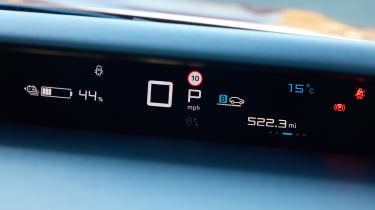
Inside, the C3 looks fairly distinctive for a small, affordable car. White highlights - and with Max trim, lightly coloured panels on the seats - lighten up the cabin. The most interesting aspect takes a leaf out of sister French brand Peugeot’s book, combining a compact steering wheel with a digital instrument panel, which is designed to be viewed from above the top of the wheel rim, rather than through it. While this set-up in Peugeot cars often divides opinion among the Auto Express test team - in many cases the wheel obstructs the view of the driving information - we thought the e-C3’s mix of a high driving position and a slim digital readout means that the system worked well and without any visibility issues.
Citroen has kept physical control for the air-conditioning, and these take the form of chunky rotary dials in the Plus trim, and big buttons on the Max.
Materials and build quality
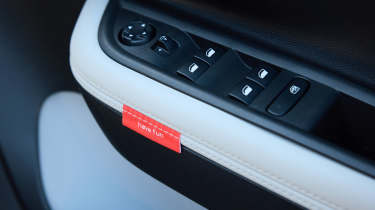
The curved dash design incorporates a shelf on the passenger side, and this area is trimmed in a woven fabric material that does a great job of making the cabin look interesting. It also brings the added bonus that it doesn’t feel as cheap as it would if it was finished entirely in hard plastic - a material that, predictably for a car at this price point, can be found in most other parts of the cabin.
Infotainment, sat-nav and stereo

The e-C3’s infotainment set-up is fairly basic, which on the plus side means that it isn’t too difficult to get to grips with. All models get the same 10.25-inch touchscreen, but built-in satellite navigation is only fitted to the higher-ranking Max trim. A row of shortcut keys sit along the right-hand side of the screen, making it easy to move from one function to the next, and loading times are reasonable if not outstanding. The system in the Renault 5 is sharper to look at, quicker to load and feels much more slick, though.
Boot space & practicality
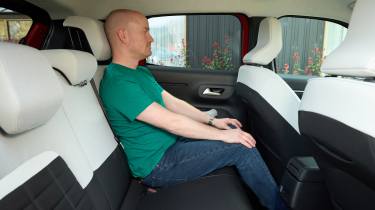
| Pros | Cons |
|
|
Practicality is always a fine balancing act in a supermini. The smaller the car is on the outside, the better it’ll be at squeezing through tight gaps in the city and slotting into small parking spaces, but that will come at the expense of interior space. The Citroen e-C3 is about average for the supermini class in terms of length, but it’s taller than most. As a result, it’s impressively spacious for a car that has such a modest footprint, with the boxy five-door shape quite adept at accommodating five people.
| Dimensions | |
| Length | 4,015mm |
| Width | 1,755mm |
| Height | 1,577mm |
| Number of seats | Five |
| Boot space | 310/1,188 litres |
Dimensions and size
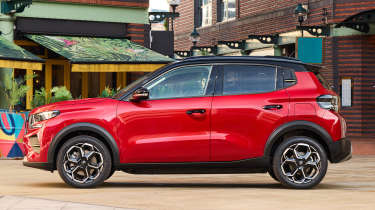
At a smidge over four metres long, the e-C3 is almost 100mm shorter than established petrol superminis like the Skoda Fabia. Citroen has managed to extract its interior space by building up; at 1,577mm tall, the e-C3 is 118mm taller than the Fabia. That tall bodystyle blurs the lines between supermini and compact SUV.
Driving position, seats & space in the front
Citroen says that the e-C3’s driving position is roughly 100mm higher than in the average supermini. Not only does this help with the view of the road ahead, but it’s also a benefit to those who find getting in and out of some other small cars a little tricky. Once you’re settled in, the Advanced Comfort seats feel more supportive than those in earlier Citroens - more side bolstering has been added to hold the front occupants in place a little better - and there’s a decent range of adjustment for both the driver’s seat and the steering wheel, which adjusts both in and out, and up and down.
Seats & space in the back
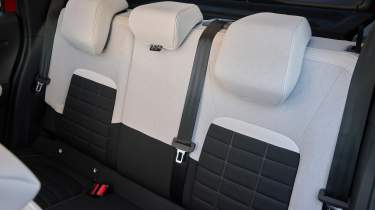
As in the front, the tall bodystyle pays dividends for rear-seat passengers, with nice, tall doors making it easy to get in and out. A cut-out in the back of the e-C3’s roof area means that even adults of well over six feet tall can settle into the rear without brushing their heads against the lining. There’s a little less wiggle room when it comes to knee space - this is a short car after all, but overall space is up with the very best in the class.
Boot space
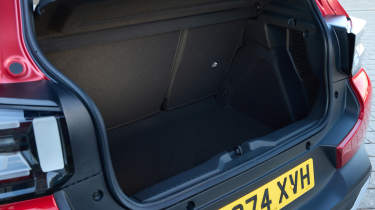
At 310 litres, the e-C3’s boot is larger than the Renault 5’s 277-litre area, but a little down on what you’ll get in the most spacious petrol-powered superminis such as the Fabia. The opening isn’t quite as wide as the barn-like rear door suggests, but it is tall, so it’s possible to make use of the 1,188-litre volume when the 60:40-split rear seat is folded down.
Expert view, on practicality
“Comapred to the other extremely talented electric supermini of the moment, the Renault 5, it’s the Citroen that’s by far the more practical of the pair” - Alex Ingram, chief reviewer. Attended the UK launch of the e-C3.
Reliability & safety
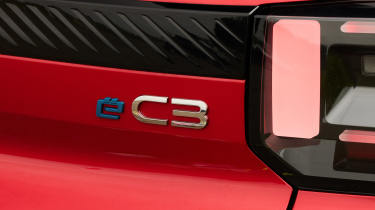
| Pros | Cons |
|
|
Front, side, and curtain airbags front and rear are all standard fit on the e-C3, though at this point the e-C3 hasn’t been tested by Euro NCAP. Much like its safety rating, the e-C3 itself is too new for us to have any specific data on how easy it will be to live with, but if it lives up to the standards of other Citroens, then things look promising. In our 2024 Driver Power customer satisfaction survey, the French brand finished an impressive fifth overall. The story was similarly impressive when approached purely on reliability grounds, with Citroen once again ranking as the fifth best out of the 32 manufacturers covered.
| Key standard safety features | Euro NCAP safety ratings |
|
|
Buying and owning
- Best buy: e-C3 Plus
While both trim levels are very competitively priced, we’d save as much money as possible and aim for the entry-level Plus trim. The Max gets some extra features, but while a reversing camera and wireless smartphone would be nice to have, the rest of the extras - which include heating for the front seats, steering wheel and windscreen, plus electric rear windows among others - aren’t absolute necessities for many people. Given the £1,700 difference in asking price between the two trims, we’d go for the cheaper option.
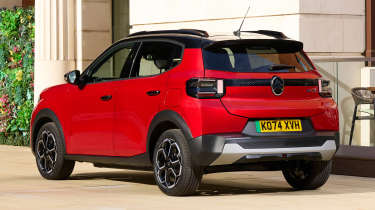
Alternatives
If comfort is your top priority, then the only viable alternative to the Citroen comes with a petrol engine. The Skoda Fabia is an excellent all-round supermini, too, although it’s a little more expensive than some other internal-combustion cars; even beside the electric Citroen, it feels like you’ll need to bag a great deal to make it feel like strong value. Renault’s Clio is almost as capable as the Skoda, yet better value for money - especially on a finance deal.
In terms of pure-electric alternatives, the closest competition comes from the Renault 5. Brilliantly stylish with fabulous in-car tech, strong performance and fine driving dynamics, the 5 is strong in plenty of areas that aren’t a priority for the e-C3. Conversely, the Citroen is far more practical, more comfortable and a little cheaper to buy than its French rival.





